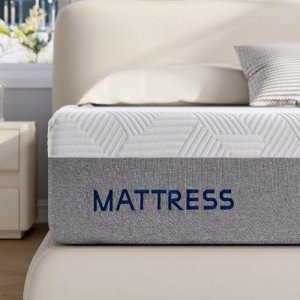20 Trailblazers Leading The Way In Memory Foam Mattress
Exploring the Benefits and Features of Memory Foam Mattresses: A Comprehensive Guide
Over the last few years, memory foam mattresses have actually surged in appeal, changing the method people consider sleep convenience. Understood for their distinct properties that offer support and minimize motion transfer, these mattresses have actually become a staple in lots of families. This post delves into the world of memory foam mattresses, exploring their functions, benefits, and factors to consider when buying one.
What is a Memory Foam Mattress?
Memory foam, or viscoelastic foam, is a type of polyurethane foam that is sensitive to temperature level and pressure. Originally developed by NASA for its crash security capability, it has actually discovered its method into the consumer market mostly in the form of mattresses and pillows.
Secret Features of Memory Foam Mattresses
- Conformity: Memory foam quickly complies with the body's shape, providing customized support.
- Temperature Sensitivity: It softens when warm and returns to its original shape once the pressure is launched.
- Motion Isolation: The foam soaks up motion, making it an excellent choice for couples.
- Toughness: Generally, memory foam mattresses have a longer life-span compared to standard spring mattresses.
Benefits of Sleeping on Memory Foam
1. Relief of Pressure Points
Memory foam mattresses master their capability to disperse body weight equally. This assists minimize pressure on sensitive locations such as the hips and shoulders, lowering the threat of discomfort and pain during sleep.
2. Improved Spinal Alignment
These mattresses promote appropriate back positioning, which is important for a relaxing night's sleep. The supportive nature of memory foam helps keep the spinal column in a neutral position, making it an excellent alternative for those suffering from back problems.
3. Minimized Motion Transfer
For people who share a bed, the ability of memory foam to soak up motion can considerably improve sleep quality. It prevents disruptions caused by a partner moving throughout the night, which is a typical problem with standard spring mattresses.
4. Hypoallergenic Properties
Memory foam is resistant to allergen and allergens, making it a suitable option for allergic reaction patients. The thick structure of the foam avoids many irritants from collecting, promoting a healthier sleeping environment.
5. Range of Options
Memory foam mattresses can be found in different types, including gel-infused, plant-based, and standard memory foam. This variety permits consumers to pick a mattress that best fits their personal preferences and needs.
Considerations Before Purchasing a Memory Foam Mattress
Although memory foam mattresses use various advantages, possible buyers should think about the list below elements:
1. Firmness Levels
Memory foam mattresses typically come in a variety of firmness levels. It's vital to select a firmness that aligns with your sleeping position:
- Side Sleepers: Benefit from a softer mattress that cushions the shoulders and hips.
- Back Sleepers: Require a medium-firm mattress for optimum back alignment.
- Stomach Sleepers: Should choose for a firmer mattress to avoid the spinal column from bending unnaturally.
2. Thickness
The thickness of a memory foam mattress can affect performance. A 10-12 inch density is typically recommended for optimum support and convenience.
3. Heat Retention
Some memory foam mattresses can maintain body heat, making them feel warmer than other types. To resolve this, think about gel-infused options or those with cooling technologies.
4. Warranty and Trial Period
Buying a mattress is a substantial financial investment. Try to find stores that use generous trial periods and warranties, enabling you to test the mattress and guarantee it meets your needs.
5. Price Range
Memory foam mattresses can vary widely in price, influenced by elements like brand credibility, materials used, and additional functions. It's vital to research study and discover a balance between quality and budget plan.
Often Asked Questions (FAQs)
Q1: How long does a memory foam mattress last?
A: Typically, a high-quality memory foam mattress can last between 7 to 10 years, depending on use and care.
Q2: Can I utilize a regular bed frame with a memory foam mattress?
A: Yes, memory foam mattresses can be utilized on different bed frames, including box springs, slatted frames, and adjustable bases.
Q3: Are memory foam mattresses safe for children?
A: Yes, memory foam mattresses are safe for kids as long as they meet safety standards and accreditations. Search For GREENGUARD Gold certification for low emissions.
Q4: How do I take care of my memory foam mattress?
A: Regularly rotate your mattress to promote even use, and use a protective cover to prevent discolorations and damage. Area tidy as required, and avoid using harsh chemicals.
Q5: Can memory foam mattresses be flipped?
A: Most memory foam mattresses are developed to be one-sided and must not be turned. Nevertheless, Memory Foam Mattress Retailer can be rotated to extend their life expectancy.
A trip to a memory foam mattress store can be an enlightening experience, providing sufficient insights into sleep comfort. With a myriad of options available and various benefits to consider, it's necessary for consumers to assess their needs thoroughly. By comprehending the advantages, key features, and aspects to consider before purchasing, customers can make an informed decision to guarantee relaxing and renewing sleep. As sleep plays a crucial role in general health and wellness, investing in a quality memory foam mattress might be among the most substantial choices one produces their sleep hygiene.
